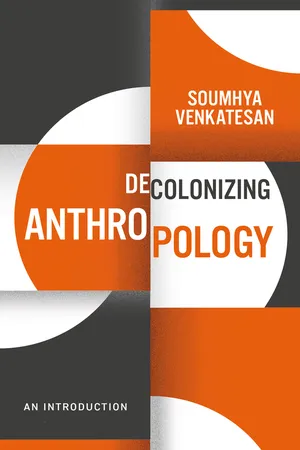
- English
- ePUB (mobile friendly)
- Available on iOS & Android
About this book
Decolonization has been a buzzword in anthropology for decades, but remains difficult to grasp and to achieve. This groundbreaking volume offers not only a critical examination of approaches to decolonization, but also fresh ways of thinking about the relationship between anthropology and colonialism, and how we might move beyond colonialism's troubling legacy.
Soumhya Venkatesan describes the work already underway, and the work still needed, to extend the horizons of the discipline. Drawing on scholarship from anthropology and cognate disciplines, as well as ethnographic and other case studies, she argues both that the practice of anthropology needs to be and do better, and that it is worth saving. She focuses not only on ways of decolonizing anthropology but also on the potential of 'a decolonizing anthropology'.
Rich with insights from a range of fields, Decolonizing Anthropology is an essential resource for students and scholars.
Tools to learn more effectively

Saving Books

Keyword Search

Annotating Text

Listen to it instead
Information
Table of contents
- Cover
- Table of Contents
- Series Title
- Title Page
- Copyright Page
- Dedication
- Acknowledgements
- Note on Racialized Terms
- 1 Introduction: Decolonizing Anthropology and a Decolonizing Anthropology
- 2 What is Decolonization?
- 3 Colonialism–Anthropology
- 4 Epistemological and Epistemic Justice
- 5 Ignorance and Ignoring
- 6 Understanding and Transforming Universities: The Potential of Ethnography and Anthropology
- 7 On Courses and in Classes
- 8 Conclusion
- References
- Index
- End User License Agreement
Frequently asked questions
- Essential is ideal for learners and professionals who enjoy exploring a wide range of subjects. Access the Essential Library with 800,000+ trusted titles and best-sellers across business, personal growth, and the humanities. Includes unlimited reading time and Standard Read Aloud voice.
- Complete: Perfect for advanced learners and researchers needing full, unrestricted access. Unlock 1.4M+ books across hundreds of subjects, including academic and specialized titles. The Complete Plan also includes advanced features like Premium Read Aloud and Research Assistant.
Please note we cannot support devices running on iOS 13 and Android 7 or earlier. Learn more about using the app